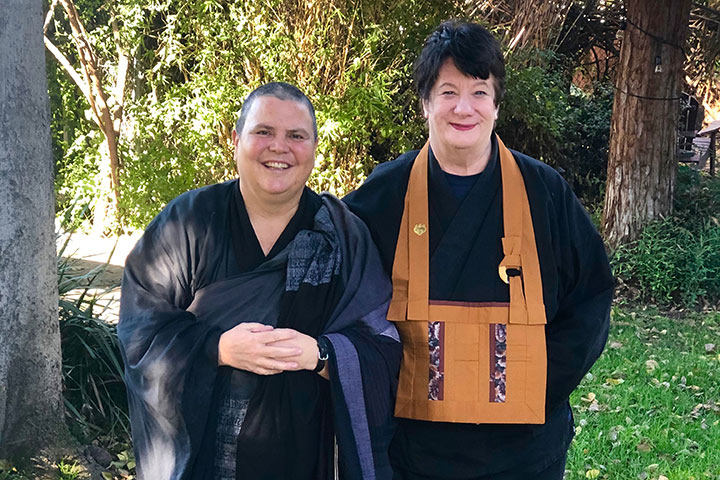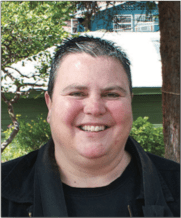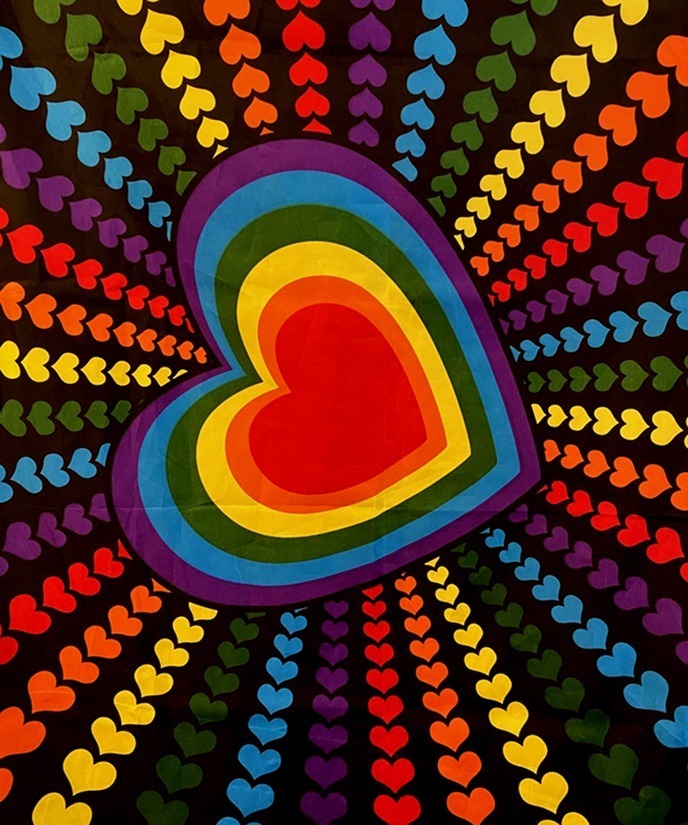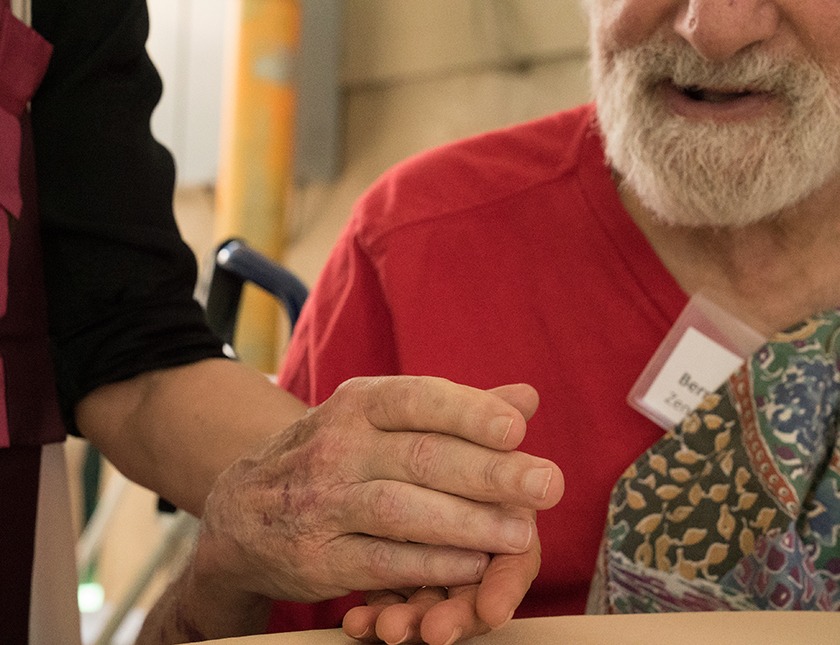
All About Love
January 1, 2021
 by Rev. Darla Myoho Fjeld
by Rev. Darla Myoho Fjeld
The Case
The first ancestor was Mahakasyapa. Once, the World-Honored One held up a flower and blinked. Kasyapa smiled. The World-Honored One said, “I have the Treasury of the Eye of the True Dharma and Wondrous Mind of Nirvana, and I transmit it to Mahakasyapa.” — Case 2 of Zen Master Keizan’s Denkoroku
Love has been in my heart-mind since Love Bernie Day when someone shared something Roshi Bernie said at a council at Auschwitz — he was distilling what our practice is all about — Roshi Bernie said: “It’s all about love, man.” That expression of what it’s all about said by that good man Bernie — that Mensch — in that place, Auschwitz, where the opposite of love had once reigned — is so powerful that it’s been living in me as a koan since I heard it.
Even before that, the seed of love was planted in me at my Shuso Hossen a few years ago when someone asked me: “How do you define love?” Without thinking, I replied: “Love is when we acknowledge the interconnection between us.”
Love has lost its meaning in our world today because we use it so casually for everything that we need, desire and admire. We say things like “I love pizza” — “I love that color on you” – “I love the way she talks” — “I love that song” — “I love you and can’t live without you” and so forth. Or we think of love in a romantic way or we say “I love you” to various people in our lives like our children, parents or friends.
We seem to use the word “love” to refer to a feeling that we might have toward other people, animals and things. My suspicion is that buried in that feeling is a need of some kind that would not be met if that person or thing were not in our lives. We fear the loss of people that we love because it will cause us to suffer.

The practice of zazen brings us to an awareness of a deeper love that is available to and flows through all of us as we realize more and more the truths of no-self, interdependence, impermanence and karma.
How might we Buddhists think about our use of the word “love”? Thich Nhat Hanh, a Vietnamese Zen Master refers to the “Four Qualities of Love” in a book he wrote by that title.
The first quality of love in Buddhism is maitri which refers to loving kindness. It refers to the intention and ability to offer joy and happiness. We can’t offer joy and happiness, however, unless we practice the three tenets of Not Knowing, Bearing Witness and Appropriate Action. Here we must emphasize Bearing Witness, because unless we really bear witness to another person and learn what that person really needs, we might stumble into bringing that person unhappiness. We must really understand another person to offer appropriate loving kindness.
The second quality or aspect of love in Buddhism is captured by the word karuna, which is usually translated as compassion. Buddhist compassion refers to our intention and ability to relieve suffering. Again, this points to bearing witness — fully observing and listening — being with another person who is in pain — offering relief to that person. It often only takes one word to reduce another person’s suffering — one pat on the back — one understanding email or text. Paying attention is key to knowing what would be the best action to take to alleviate suffering.
The third quality of love in Buddhism is mudita, which is translated as joy. In our positive emotions class that Rosh Egyoku led, we defined mudita as “sympathetic joy” — the happiness we feel when other people are happy. Thich Nhat Hanh believes that mudita is about our own joy and the joy of others. It is a joy filled with peace and contentment. We are overjoyed when we see happiness in others, but we are also overjoyed by our own happiness.
Lastly, we have the quality of upeksha which means equanimity — this is a quality of no-clinging — letting go — like when we unclench our fist. We take the widest view and look at all sides with no discrimination. To love in this way is to come from a place of no me and no you, no self and other. We love equally because ultimately all are equal in the Dharma — all beings are Buddha. This quality of equanimity keeps us from being possessive in our love.
When we are possessive with another person, we destroy his or her freedom to be themselves. With true love, neither person is in a prison.

Photo by Peter Cunningham
When we practice, these aspects of love naturally arise in us. Perhaps you have experienced this. But we often find ourselves being selfish and jealous — I do anyway — and I find it helpful to gently come back to the place of love that I am developing in my Zazen. That place of openness and open heartedness.
The reason we get so caught up in the dramas of selfishness, jealousy, greed, anger, ignorance and lust is that we get caught up in need-love, rather than seeing Love as the magnetic force that binds us all together. We get it wrong because we deny that we are interdependent every time we assert that we are separate — every time we break a precept — every time we speak ill of the Three Treasures. We do this even though there are so many hints and signs that we are interconnected — like the way a virus spreads — or how yawning or smiling is contagious — or how one person in a bad mood can bum out everyone around him or her. Just think how much effect we could have practicing loving kindness, compassion, joy and equanimity.
Love moves through us and always comes from the foundation of “I and everything are in this life together.” There is no “I” per se — there is only “We” — and that “We” contains all that is, was and will ever be. This shifts us away from self-preoccupation. It takes us out of thinking that there’s a little “me” inside my body somewhere that is at the center of everything and replaces it with Love.
Of course, we hate this. We like living in our dramas. We all have our little stories about how hard our lives have been and why we act the way we do. But when we let those stories become beliefs about who we are, we are setting ourselves up for drama. Really stubborn people may live their whole lives caught up in the self-centered drama of their own stories and never really get to experience life as it is. I know I don’t want that for my life. How about you?
So as long as we stay stuck in the prison of our own personal stories, we will continue to create dramas wherever we go. To live life in this way is to deny the love connection that runs through us all. Love lives beneath the stories that we tell ourselves.
Think about all the stories we tell ourselves about love and the loss of love. With romantic love, we really put trips on each other that are based on our attachment to permanence. We act like this one person will make everything in our lives perfect. That’s quite a trip to put on a person.
So, this is what I meant when I said that Love is when we acknowledge the interconnection between us. Love is not about another person per se — love is everywhere — we just have to see it. Everything really boils down to realizing experientially the fact of interconnection — that everything depends on everything. This is what the Buddha realized when he sat down under the Bodhi Tree. Love is when we truly experience the interdependence of everyone and everything and when we act in hurtful ways, we are denying that reality — we are living in the delusion of being separate.
When Roshi Bernie said “It’s all about love, man,” I believe he had interdependence in mind. This deep statement will be a guiding koan for me for the rest of my life. I have often repeated Roshi Bernie’s definition of enlightenment as a greater and greater awareness of interconnection. I see now that another way to put this is to say, “Enlightenment is Love.” Love is the connectivity that lies at the heart of the universe.
The transmission story of the World-Honored One holding up a flower and Mahakasyapa responding with a smile is a perfect illustration of Love — of what is meant by interconnection.
Master Keizan tells us in his Teisho on this case: “Shakyamuni and Mahakasyapa became acquainted and their life pulses intermingled.”
The Buddha held up a flower and Mahakasyapa smiled.
The Buddha offers each of us a flower: How do you respond?
Rev. Myoho is a Dharma Holder, priest and Temple Development Steward.
